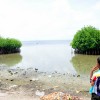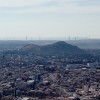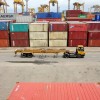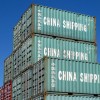News headlines in February 2017, page 4
Making the Deep Blue Sea Green Again
- Inter Press Service

UNITED NATIONS, Feb 20 (IPS) - Kids growing up in the Seychelles think of the ocean as their backyard, says Ronald Jean Jumeau, the Seychelles ambassador to the UN.
Alternative Mining Indaba Makes Its Voice Heard
- Inter Press Service

CAPE TOWN, South Africa, Feb 18 (IPS) - "Comrades, we have arrived. This cherry is eight years awaited. We have made it to this place," Bishop Jo Seoka told the crowd, pausing to allow for the whistles and cheers.
Expansion of Renewable Energies in Mexico Has Victims
- Inter Press Service

KIMBILÃ, Mexico, Feb 17 (IPS) - The growing number of wind and solar power projects in the southern Mexican state of Yucatán are part of a positive change in Mexico's energy mix. But affected communities do not see it in the same way, due to the fact that they are not informed or consulted, and because of how the phenomenon changes their lives.
The Planned US Border Tax Would Most Likely Violate WTO Rules - Part 2
- Inter Press Service

PENANG, Feb 17 (IPS) - As American lawmakers and the Trump administration prepare the ground for introducing a border adjustment tax, many controversial issues have emerged, including whether they go against the rules of the World Trade Organisation (WTO).
Still in Limbo, Somaliland Banking on Berbera
- Inter Press Service

HARGEISA, Somaliland, Feb 17 (IPS) - Crossing African borders by land can be an intimidating process (it's proving an increasingly intimidating process nowadays in Europe and the US also, even in airports). But crossing from Ethiopia to Somaliland at the ramshackle border town of Togo-Wuchale is a surreally pleasant experience.
Beware of the New US Protectionist Plan, the Border Adjustment Tax
- Inter Press Service

PENANG, Feb 17 (IPS) - A new and deadly form of protectionism is being considered by Congress leaders and the President of the United States that could have devastating effect on the exports and investments of American trading partners, especially the developing countries.
Improved Cookstoves Boost Health and Forest Cover in the Himalayas
- Inter Press Service

DARJEELING, India, Feb 17 (IPS) - Mountain communities in the Himalayan region are almost entirely dependent on forests for firewood even though this practice has been identified as one of the most significant causes of forest decline and a major source of indoor air pollution.
Washington Rules Change, Again
- Inter Press Service

KUALA LAMPUR, Feb 16 (IPS) - Over the last four decades, the Washington Consensus, promoting economic liberalization, globalization and privatization, reversed four decades of an earlier period of active state intervention to accelerate and stabilize more inclusive economic growth, associated with Franklin Delano Roosevelt and John Maynard Keynes.
Energy Access Builds Inclusive Economies and Resilient Communities
- Inter Press Service

NEW DELHI, Feb 16 (IPS) - Jaipal Hembrum runs three one-man home enterprises - a bicycle repair shop, a tiny food stall and a tailoring unit in Kautuka, a remote village in eastern India. Sewing recycled clothes into mattresses late into the evening, the 38-year-old father of three girls says two light bulbs fed by a solar power system have changed his life.
Corruption Brings Down an Empire: Odebrecht in Brazil
- Inter Press Service

RIO DE JANEIRO, Feb 16 (IPS) - People in Brazil have been overwhelmed by the flood of news stories about the huge web of corruption woven by the country's biggest construction company, Odebrecht, which is active in dozens of fields and countries.
The business empire built by three generations of the Odebrecht family is falling apart after three years of investigation by the Lava Jato (car wash) operation launched by the Federal Public Prosecutor's office in Brazil, which is investigating the corruption that diverted millions of dollars in bribes in exchange for major public works contracts from the state-run oil giant Petrobras.
Marcelo Odebrecht, who headed the company from 2008 to 2015, was arrested in June 2015 and was initially sentenced to 19 years in prison.
In October he and the company reached plea bargain deals to cooperate with the investigation. A total of 77 former and present Odebrecht executives provided over 900 sworn statements to Lava Jato prosecutors, causing a political earthquake in Brazil and throughout Latin America.
In December, the U.S. Justice Department revealed that Odebrecht allegedly spent 1.04 billion dollars in bribes to politicians and government officials in ten Latin American and two African countries, including Brazil, which accounted for 57.7 per cent of the total.
The United States is carrying out its own investigation, which could end in criminal convictions, since several Odebrecht subsidiaries, such as the petrochemical company Braskem, operate there, and their shares are traded on the New York Stock Exchange.
That is also happening in the case of Petrobras, implicated in the corruption scandal and under investigation at the initiative of shareholders in the U.S.
The U.S. and Switzerland, where banks were allegedly used to funnel bribes or launder money, signed cooperation agreements with legal authorities in Brazil, as part of the ongoing offensive against corruption in Latin America's giant.
The impacts are overwhelming. In Brazil, the revelations about Odebrecht are expected to provoke a tsunami in the political system. Two hundred parliamentarians and government officials may have received bribes, including senior members of the current administration and legislature.
The business group had created a specialised bribe department. According to U.S. justice authorities, every dollar "invested" in bribes produced 12 dollars in contracts.
That estimate is based on more than 100 projects carried out or in progress in Argentina, Brazil, Colombia, Dominican Republic, Ecuador, Guatemala, Mexico, Panama, Peru and Venezuela, plus Angola and Mozambique in Africa.

Part of the Caracas valley seen from the San Agustín Metrocable, one of the many works assigned to Odebrecht in Venezuela during the government of Hugo Chávez (1999-2013), when the Brazilian company became the biggest construction firm in the country. Credit: Raúl Límaco/IPS The arrest warrant issued by a court in Peru against former Peruvian president Alejandro Toledo (2001-2006), who has been living in the United States, and allegations implicating current Colombian President Juan Manuel Santos and Panamanian President Juan Carlos Varela, are just the tip of the iceberg.
What was revealed by Odebrecht executives and former executives, as well as former directors of different departments, such as external affairs, infrastructure, industrial engineering or logistics, has not yet been made public.
New figures involving alleged bribes are expected to come out over the next few months, added to those already disclosed in the United States, including 599 million dollars distributed in Brazil, 98 million in Venezuela, 92 million in the Dominican Republic, 59 million in Panama and 50 million in Angola.
In Peru the total revealed so far is "only" 29 million dollars since 2005. The sum is small, considering that for the Southern Peru pipeline - still under construction – alone, the projected investments amount to seven billion dollars. The Peruvian government has decided to terminate the contract with Odebrecht for the project.
Besides Odebrecht, the Inter-Oceanic Highway, which runs across southern Peru from the Brazilian border to Pacific Ocean ports, is being built by three other Brazilian construction firms - Camargo Correa, Andrade Gutierrez and Queiroz Galvão – which are also under investigation for suspicion of corruption.
During the presidency of Alan Garcia (2006-2011), Peru and Brazil signed an agreement for the construction of five large hydropower plants in Peru, which was cancelled by his successor, Ollanta Humala (2011-2016), who, however, is suspected of receiving three million dollars from Brazil for his election campaign.
Odebrecht, which has a concession to manage Chaglla, the third biggest hydroelectric plant in Peru, with a capacity of 462 MW, was to be the main construction company in charge of building the new plants.
 Global Issues
Global Issues
